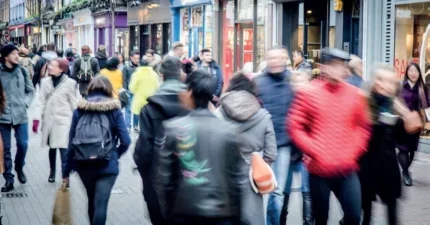
When I was a lad and starting as a Saturday boy in the family drycleaning business in the late 60s , the British High Street was very much like one’s own private village, even if it was in a major city people said good morning. There would be a great variety of shops, from fish mongers to bakers, pet shops and cleaners, to your typical mom and pops shop, where one’s own parents would often send you to get cigarettes for them which was done with no problem and in all innocence. I remember the big excitement in our High Street when we had our first vinyl music shop open with booths inside, so that you could listen to the record before you purchased it. Probably very similar to streets populated by Mom and Pop shops in the USA.
Where I lived, the record shop was opposite a toy shop which sold Action Man, which is of course famous as GI Joe in North America, every boy’s hero, and let’s face it, even though I’m now past 60 years of age I still have a few and am proud to do so.
The 1980s was a decade of yuppies, expensive suits and a very good income from drycleaning. Every Saturday people would be queueing at the door with bundles of drycleaning, and even then I wondered how long could it be kept up for.
I detected quite a few underlying changes on the High Street in that time and many local shops were now being bypassed for branded names and new stores. Mom and Pop store owners were now getting elderly and found it hard to compete with national brands with deep pockets. It was as if the very fabric (pardon the pun) of these places in the towns and villages was being stripped away.
Cities tried to compete and tempt shoppers by opening up huge shopping malls which you could take the family to and spend the day. We had a shopping centre near where we lived in Milton Keynes, which was one of the first in Europe. I liked it and delighted at the array of model shops and another a small independent outlets who were not doing the inevitable clothes, shoes, bags, clothes and so on.
I remember with great disdain when my favourite two model shops in Milton Keynes shopping centre had to close because of enormous increases in the rent by the landlords. Nowadays, all such shopping centres leave me cold and I avoid them. I know that there must be plenty of people whose highlight of the week is to visit these places, and may you be cured soon, but there are now many huge empty stores.
A High Street in the 20th century would typically have cafés, ironmongers, electrical shops, a toy shop, Woolworths, local specialist craft shops, wool shop, a baby store and independent eateries and, of course, drycleaners.
There are some pieces to my High Street puzzle that certainly make me feel better about business decisions that I have taken. Big corporations have layers of managers with various specialised areas on inflated salaries. How could they not have foreseen when that the enormous retail units would fall fallow as the launch of the internet and the meteoric rise of on-line shopping companies like Amazon? There are whole swathes of empty businesses in North America and Europe where there are deserted malls that are like film sets for some post-apocalypse movie.
Of course, service companies like drycleaners and laundries are still trading because what we do cannot be done over the internet. In a twist of fate, Amazon has provided millions of Mom and Pop operations with the ability to continue trading from the comfort of their own homes. Amazon does the picking and packing Mom and Pop can now sell from the kitchen. So here we have one of the world’s biggest businesses which has actually helped the small guy.






